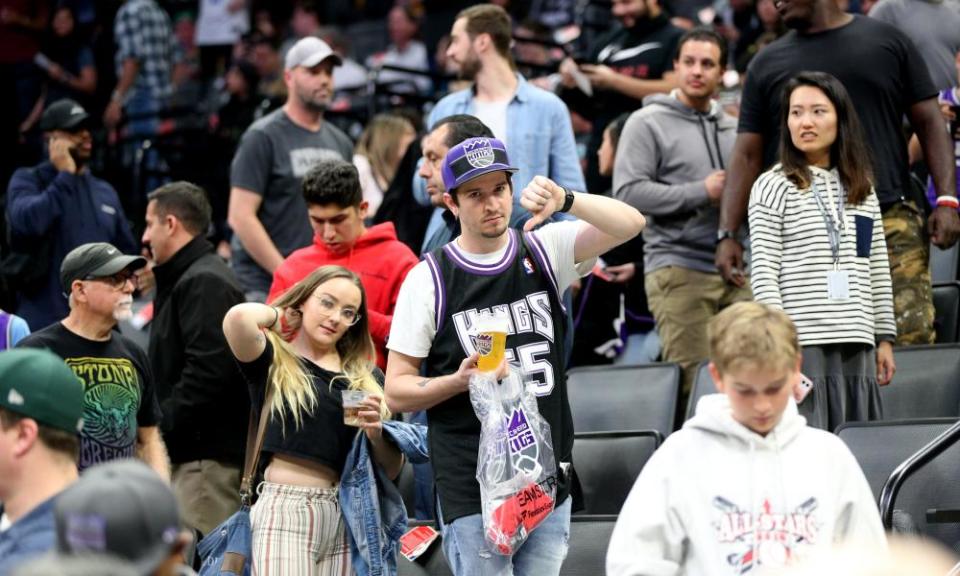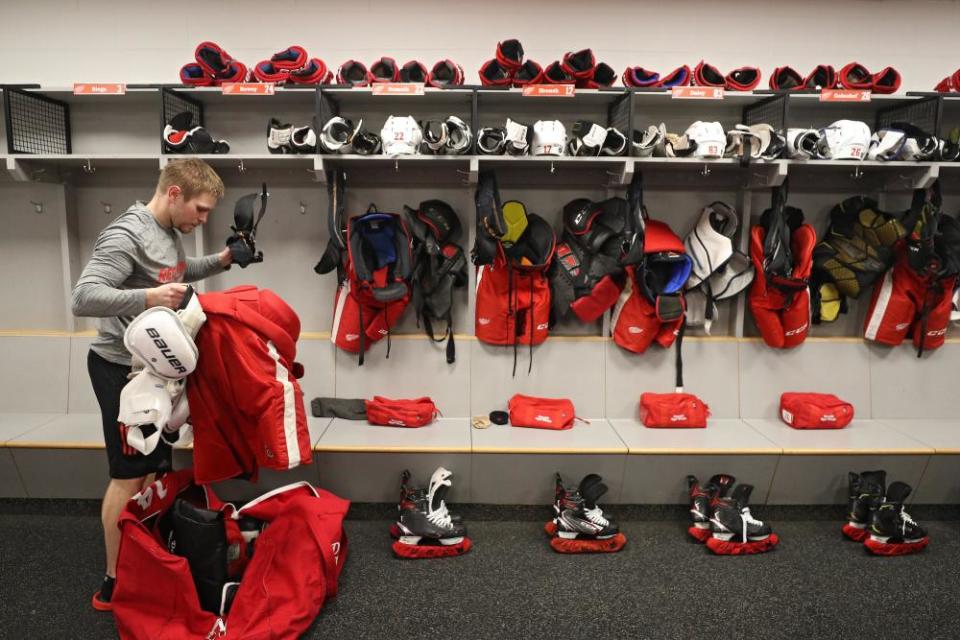Finances will be shattered by sports suspensions. But it won't be the stars who suffer

On the surface, the Wednesday afternoon matinee between the Chicago White Sox and Baltimore Orioles back in April 2015 appears as nondescript as it gets. It was an early season contest between a pair of teams hurtling toward mediocrity. The Orioles won 8-2, powered by a six-run first inning – but that isn’t why we’re talking about it. Peel back the box score, and the otherwise forgettable game’s novelty comes into focus: it marked the first time in Major League Baseball’s long history that two teams squared off with no fans in attendance, an extraordinary measure taken in response to the unrest in Baltimore that followed the death of Freddie Gray, a black man who was killed in police custody weeks earlier.
Five years after that surreal afternoon in Baltimore, and amid a pandemic that has left people around the world unnerved and anxious, the crowdless game may represent the American sporting community’s only hope of salvaging its competitions – and revenues.
That is, of course, if the games are played at all. By Wednesday night, the NBA was prepared to take its own drastic measures. With some games already underway around the league, fans gathered at Chesapeake Energy Arena to watch the Oklahoma City Thunder host the Utah Jazz. Starting lineups were announced, and officials prepared for tipoff. But after an extended delay, the game was abruptly postponed. The reason quickly came into focus: Rudy Gobert, the all-star center for the Jazz, tested positive for the coronavirus. Moments later, news broke that the NBA was suspending its season “until further notice.” On Thursday, other domestic leagues signaled they would follow the NBA’s lead. Major League Soccer and the National Hockey League both announced that they were suspending their seasons for 30 days. MLB said its new season, due to start at the end of March, will be delayed for at least two weeks.
Related: MLS and NHL suspend seasons as coronavirus delays start of MLB campaign
The economic impact of the sporting world grinding to a halt could be enormous, though it may still be too early to gauge. NBA officials are anticipating potentially “losses in the hundreds of millions of dollars across the sport,” according to an ESPN report, another blow for a league still reeling from the economic damages from its frayed relationship with China. Mark Emmert, the president of the National Collegiate Athletic Association, said he expected the organization to lose tens of millions of dollars in ticket revenue as a result of playing college basketball’s biggest tournament behind closed doors. Shortly afterwards, the tournament was cancelled altogether.
“You can’t begin to get to any exact numbers until you see how much worse this gets, and how much more extensive the sports and entertainment cancellations end up being,” says David Carter, a professor at the University of Southern California and an expert on sports business and marketing.
Carter says that the ripple effects of the slowdown will vary depending on the league and the market. Leagues such as MLS and NHL, he pointed out, are “more reliant on attendance than the NBA, which is more reliant on media contracts.” Carter adds that “playing games without fans, you could argue, is less of an issue in the NBA and NFL than these other sports.”
But Carter is quick to say that while some leagues are more insulated than others, and markets with only one sports team are likely to suffer more than a city like Los Angeles with a massive global economy of its own, “no one is even remotely impervious to what’s going on.”

He points to cities that were scheduled to host NCAA tournament games next week as particularly vulnerable to the changes. “If spending that would have otherwise gone to the arena goes to other parts of town, then everybody should be OK,” Carter says. “But when we talk about March Madness, that’s sports tourism. That’s new money coming into where these games are being played. Those cities bid to be hosts because it brings heads in beds.”
Edward Schauder, an attorney who specializes in sports business, says that a postponement rather than an outright cancellation may ultimately help leagues avoid significant losses. “By postponing, you still have a chance to get 100% of the revenue and eliminate 100% of the risk,” he tells the Guardian, noting that leagues have suspended play before, whether to allow players to compete in international competitions such as the Olympics or for general work stoppages.
Related: The NBA continued despite earthquakes and death. But Covid-19 is different
“It’s a prudent decision,” Schauder says of the NBA’s suspension of the season. “It’s a smart play because you’re not forfeiting the revenue from the live game. When the stock market loses money, you don’t lose money until you sell. The NBA is just deferring its revenue streams until a future point in time. If they cancel the season, it’s a different conversation.”
Schauder says the deepest, and most immediate implications, will be felt by those employed by the stadiums, which play host to other entertainment ventures along with sporting events, as well as nearby businesses that capitalize on those gatherings. “Players are going to be fine, the league is going to be fine. The real economic impact are these people who rely on this money, and it’s countless workers: bathroom attendants, ushers, vendors, security personnel, the union workers – it goes on and on,” Schauder says. There are signs that teams are willing to help workers: the Cleveland Cavaliers said they will compensate “our event staff and hourly workforce that is impacted with the changes to our regular event schedule.” Cavaliers star Kevin Love said he would donate $100,000 to compensate staff affected by the NBA suspension.
And Schauder believes that the NCAA could bear the largest brunt of the outbreak. “With the cancellation of March Madness, the NCAA, its student athletes and fans have emerged as collateral damage of the coronavirus. Unlike the professional leagues that have suspended their respective seasons and may still resume their seasons at some point in time … the NCAA tournament has been completely wiped out,” he says. “As a result, seniors will not be afforded the opportunity to showcase their talents prior to the NBA draft and there will not be any of the anticipated upsets and magical moments that would have allowed student athletes to capitalize on under the new ‘pay to play’ laws in certain states. Sponsors may also have the right under force majeure clauses to claw-back on sponsorship dollars advanced to the NCAA.”
Even in its offseason, the country’s most popular league, the NFL, has been affected. The NFL Draft is scheduled to be held 23 April in Las Vegas, where there have been several positive Covid-19 cases. The league’s annual meeting, a confab of all 32 team owners, was scheduled for the end of this month in West Palm Beach, Florida, but on Thursday it was canceled.
The ever-shifting approach to the crisis dovetails with the swift spread of the virus itself. Players have experienced their own real-time evolution on the matter. Last Friday, Los Angeles Lakers superstar LeBron James scoffed at the idea of playing games behind closed doors. “If I show up to an arena and there ain’t no fans in there, I ain’t playing,” James said defiantly. But by the following Tuesday, with the pandemic spreading, the country’s most recognizable athlete shifted his position, signaling a better understanding of the severity of the situation. “You gotta listen to the people that keep track of what’s going on,” James said. “If they feel like it’s best for the safety of the players, safety of the franchise, safety of the league to mandate that, then we’ll all listen to it.”
It appears that James and his fellow athletes may be listening to the advice of those medical experts for some time to come.

